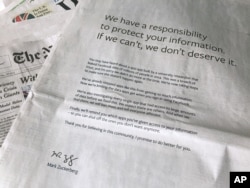The European Union's consumer protection chief said Thursday she's growing impatient with Facebook's efforts to improve transparency with users about their data, warning it could face sanctions for not complying.
EU Consumer Commissioner Vera Jourova turned up the pressure on the social media giant, saying she wants the company to update its terms of service and expects to see its proposed changes by mid-October so they can take effect in December.
"I will not hide that I am becoming rather impatient because we have been in dialogue with Facebook almost two years and I really want to see, not the progress — it's not enough for me — but I want to see the results,'' Jourova said.
The EU wants Facebook to give users more information about how their data is used and how it works with third party makers of apps, games and quizzes.
"If we do not see the progress the sanctions will have to come," she said. She didn't specify punishment, saying they would be applied by individual countries. "I was quite clear we cannot negotiate forever, we just want to see the result."
The EU has been pressing the U.S. tech company to look at what changes it needs to make to better protect consumers and this year Facebook has had to adapt to new EU data protection rules. The concerns took on greater urgency after the Cambridge Analytica data privacy scandal erupted, in which data on 87 million Facebook users was allegedly improperly harvested.
Jourova said she hopes Facebook will take more responsibility for its nearly 380 million European users.
"We want Facebook to be absolutely clear to its users about how their service operates and makes money," she said.
Facebook said it has already updated its terms of service in May to incorporate changes recommended at that point by EU authorities.
The company said it "will continue our close cooperation to understand any further concerns and make appropriate updates."
Jourova also said U.S.-based property rental site Airbnb has agreed to clarify its pricing system in response to complaints that it could mislead consumers.
Airbnb has promised to be fully transparent by either including extra fees in the total price for a booking quoted on its website or notifying users that they might apply, she said.
The company is complying with EU demands spurred by concerns that consumers could be confused by its complicated pricing structure, which could add unexpected costs such as cleaning charges at the end of a holiday.
Airbnb is also changing its terms of service to make it clear that travelers can sue their host if they suffer personal harm or other damages. That's in response to complaints that its booking system can leave tourists stranded if the rental is canceled when all other arrangements have been already made.
Airbnb said "guests have always been aware of all fees, including service charges and taxes, before booking listings," and will work with authorities to make it even clearer.











